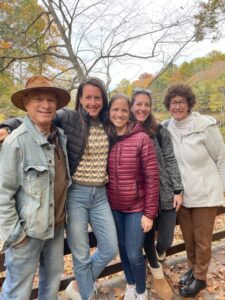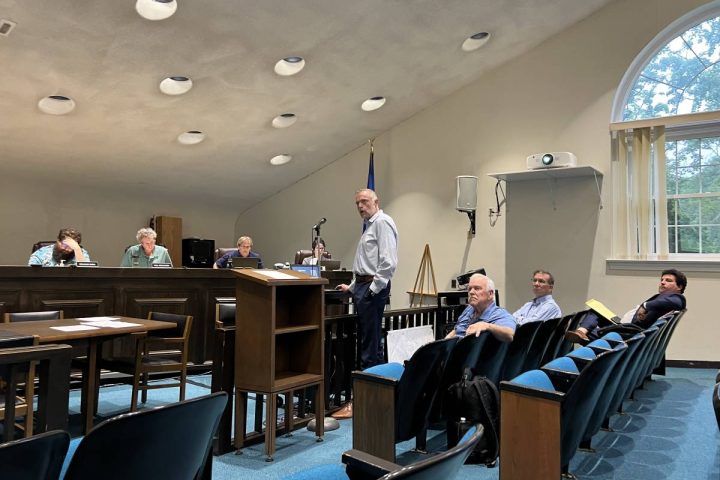David Wolfe, 69, of Monroe, went to the hospital with internal bleeding in March of 2020 and it took doctors three days to find its source, a malignant tumor on his small intestine. A surgery removed it and Wolfe learned he is susceptible to slow growing tumors. His oncologist recommended not taking medication for it due to the side effects.
Several months later, Wolfe was relieved to have a clean scan showing no more tumors. But he received sobering news from another scan in October of 2021. He was getting a COVID test a few days before knee replacement surgery when his oncologist called.
“‘I have news for you. It looks like it’s metastasizing,'” Wolfe recalled his doctor telling him. “He said it’s Stage 4 cancer and it’s incurable, but treatable. All you hear is ‘Stage 4’ and ‘incurable’. I was a little confused. He said have your knee surgery.”
The tumors were not slow growing after all and Wolfe had several inside his body. He has GIST (gastrointestinal stromal tumor), a rare form of cancer, making up less than one-percent of all gastrointestinal tumors. Approximately 4,000 to 6,000 adults in the United States will be diagnosed with a GIST every year, according to Cancer.Net.
Wolfe, who is known by many as a rotarian in town, is currently doing well with treatment and is adamant he does not want people’s sympathy.
GIST is not as well-known other cancers, like breast cancer. Part of that is because many patients don’t speak publicly about their diagnosis.
“I didn’t tell anybody. I didn’t tell my wife,” Wolfe said of first getting the diagnosis. Wolfe had to tell Rachel, his wife of 43 years, when the biopsy showed the tumors metastasized.

He told his daughters at Thanksgiving two years ago, which he said was the hardest thing he had to do.
“I did not tell many people, very few,” Wolfe said. “A few of my relatives know, not all know. I didn’t tell my mother, who died in April. I didn’t want people to pity me. I didn’t want them to feel sorry for me. On October 17 I’ll be 70-years-old. That, to me, is an achievement. I didn’t think I’d get to 70.”
Now that Cancer Awareness Month is here, Wolfe said it is time to talk about his diagnosis in hopes of benefiting The Life Raft Group, a national nonprofit that has been helping him and many others.
“It’s time for me to come out of the cancer closet and say, ‘this is what’s going on,'” Wolfe said. “It’s time to educate people and let them know.”
“We’re so excited to be working with him on his fundraiser,” Diana Nieves, chief development and involvement officer at Life Raft, said in a telephone interview. “He’s been an awesome advocate for the community internally, so him sharing his story means a lot, because he’s spreading awareness of this rare cancer.”
Nieves said GIST is often misdiagnosed, because there is not as much awareness of the disease, even in the medical community. If there is not an expert on a medical team, she said testing to ensure patients get the treatment they need is difficult.
Mentors provide moral support
While doing research on GIST, Wolfe stumbled upon The Life Raft Group, a nonprofit providing resources for GIST patients, including information, discussion groups, events and a mentor program, in which someone who has been living with the disease provides emotional support and shared knowledge for a newer patient with a similar diagnosis.
When Wolfe used the website’s contact email, he was surprised to receive a phone call the next morning. The staff member told him he should get a GIST specialist to treat him and do mutational testing.
Wolfe met his oncologist for a biopsy and confirmed that he is not a GIST specialist, so Wolfe moved his care elsewhere.
“We’re fortunate to be near New York and Boston with great hospitals and some of the best cancer care on the planet,” he said.
Wolfe was a regular donor to the Memorial Sloan Kettering Cancer Center, so he decided to go there. His physician is Dr. Ciara Kelly. “She’s smart, cautious. She’s Irish and has an Irish accent,” he said with smile, adding how happy he is with his oncologist.
One of the resources The Life Raft Group has is a doctors’ registry of GIST experts. Wolfe has also benefited from being matched up with a volunteer mentor with a similar experience as him.
His mentor participated in the original clinical trials for Gleevec, the first drug used to treat patients with GIST. Wolfe said the fact that it was 22 years ago and his mentor is still here gives him hope.
“He turned 80,” Wolfe said. “His doctors said, ‘I don’t know what you’ll die from, but it won’t be GIST.’ He’s still on medication. I’m a mentor now, but I don’t have anyone yet.”
Wolfe said a lot of “old timers” have been living with GIST for 10 years and others for 15. “It’s manageable. You could live for years,” he said. “I see the reality. Some people are living for long periods of time.”
The Life Raft Group
The Life Raft Group started in 2002, supporting research and offering education and support programs.
“Right now, we’re a small team and we support the entire U.S.,” Nieves said. “We’re fortunate to have a lot of volunteers who help out with mentors and support groups.”
Because GIST is a rare form of cancer, she said the support groups give patients an opportunity to talk to others who are experiencing the same things they are, someone who “gets it” and can offer encouragement and support.
“If I’m not doing well, how do I share this with my spouse? I’m taking this treatment. I’m having side effects. Who else out there is like me?” Nieves said of some of the questions people ask in the support groups.
“We are here to help and to offer hope that no one has to face this alone,” — Diana Nieves, chief development and involvement officer at Life Raft
“We receive feedback about how important it is,” she said. “We have support groups for caregivers and loved ones. We bring everyone in.”
“Our educational programs and our website is rich with information,” Nieves said. “We’re close with institutions with GIST specialists, sharing awareness, making sure people in the U.S. are aware of this cancer and educating as many people as we possibly can — as well as doctors and other medical professionals.”
Nieves said Life Raft is focused on “patient power research” and shares data reported by patients about their test results and cancer journeys with researchers, who can focus on a cure.
“We are here to help and to offer hope that no one has to face this alone,” Nieves said.
“I’m trying to raise funds for Life Raft,” Wolfe said. “They’ll put up a page for me. As good as they are, their resources are limited.”
Through his marketing and promotions business, Wolfepromo, Wolfe made a logo, “Know the GIST, Fight the GIST”, and will make lapel pins and beanies. Life Raft set up a donation page for Wolfe that can be accessed by clicking here.
“This is a small campaign,” he said. “The main thing is to get the word out. I know what Life Raft does for me and I know what it does for others. It’s a good organization.”
“This town has been so supportive of each other,” said Wolfe, a Monroe resident since 1987. “When people need help, they help others. This isn’t my handout, asking them to help me. It’s really for all the other GIST patients out there. I’m included in that, but I’m just one of them.”
‘No Day But Today’

A common therapy for GIST is surgery, if doctors can take the tumors out. But if it’s successful, the tumors can reoccur. The next stage, even if you have the surgery, is medication — not chemo or radiation, according to Wolfe.
Wolfe started taking Gleevec early on in his treatment. It worked for a while, until his body became resistant to the drug. Drugs target the DNA of the tumors. Gleevec has been around for about two decades and a few more drugs were produced since, Wolfe said.
Under Dr. Kelly’s care, Wolfe goes for scans and he and his doctors check in with each other. Labs are done every few weeks.
“When I started up here I was getting it done every week,” Wolfe said. “I drive to Harrison most of the time to get my labs done. I drive an hour for a five minute scan. My older daughter lives in New York, so I visit her.”
Dr. Kelly connected Wolfe with other doctors, because the drugs can affect other things, like the kidneys.
“They monitor and adjust my dosage,” he said. “I take Qinlock now. So far, so good. The most common side effect is fatigue and loss of some body hair. I lost most of my body hair. I have abdominal cramps from time to time, sometimes muscle cramps. These are very common side effects.”
Wolfe takes two 50 milligram tablets a day.
“I feel pretty good. I lost a bunch of weight. That was a side effect,” he said, adding he has six or seven tumors that the medication keeps under control.
Wolfe goes for a scan every two months and it can be stressful waiting for the results. But he is living life to the fullest. Wolfe and his wife are traveling a lot and he loves seeing Broadway musicals. “‘Rent’ is my favorite,” he said.
He can relate to one song from the musical, “No Day But Today.”
“I’m living this,” Wolfe said. “I can’t think about tomorrow. I do what I need to do today.” Of GIST, he said, “I have had it for three-and-a-half years. The good news is I’m still around and I know a little more about it.”
All respectful comments with the commenter’s first and last name are welcome.






